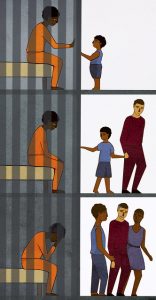The rising number of people in prison and jail has had a dramatic impact on families and children in the United States. By 2012, nearly 2.6 million children had a parent in prison or jail. Parental imprisonment has many harmful impacts on children, including childhood development and cognition, drug abuse, educational success, and childhood homelessness. Although in some cases the incarceration of a parent is necessary to protect the best interests of the child, the “incarceration ledger” — or the complex ways incarceration impacts lives — is generally negative for kids.
One way parental imprisonment negatively impacts families is by removing a source of income. When incarcerated parents are the key economic support to their family, their absence means a loss of resources. The remaining caregiver may experience significant financial strains, and may have less time to supervise and provide guidance for their children. Children thus may lose both economic and emotional support due to the absence of a family provider. Even when incarcerated fathers do not contribute to family support, their incarceration can still result in financial pressures on their relatives, who have to pay for significant court costs, transportation for visits, and phone calls to prison.
- Joice A. Arditti. 2013. Parental Incarceration and the Family: Psychological and Social Effects of Imprisonment on Children, Parents, and Caregivers. New York University Press.
- Johnna Christian, Jeff Mellow, and Shenique Thomas 2006. “Social and Economic Implications of Family Connections to Prisoners.” Journal of Criminal Justice 34(4): 443-452.
- Megan Comfort. 2009. Doing Time Together: Love and Family in the Shadow of the Prison. University of Chicago Press.
Studies find that children who have experienced parental incarceration are also at risk of many negative mental health outcomes including depression, PTSD, anxiety, and behavioral problems. However, these negative mental health effects may not apply to every case of parental incarceration. Research demonstrates that the incarceration of a father is associated with increased physical aggression for boys, but this association does not hold for boys whose father was incarcerated for a crime of violence or who were abusive to their mothers. Other research suggests that paternal incarceration is connected to higher levels of behavioral problems in children, but this was limited to children who lived with their father prior to his incarceration.
- Wade C. Jacobsen. 2019. “The Intergenerational Stability of Punishment: Paternal Incarceration and Suspension or Expulsion in Elementary School.” The Journal of Research in Crime and Delinquency 1-43.
- Christopher Wildeman. 2010. “Paternal Incarceration and Children’s Physically Aggressive Behaviors: Evidence from the Fragile Families and Child Wellbeing Study.” Social Forces 89(1): 285-309.
The massive growth in parental incarceration is also tied to racial inequality among children. While 1 in 25 white children born in 1990 are at risk of experiencing parental imprisonment, the rate for black children is 1 in 4. These disparities contribute to racial inequality in childhood homelesness, infant mortality, child behavioral and mental health, cognitive development, and educational achievement.
- Anna R. Haskins. 2016. “Beyond Boys’ Bad Behavior: Paternal Incarceration and Cognitive Development in Middle Childhood.” Social Forces 95(2): 861–892.
- Sara Wakefield and Christopher Wildeman. 2013. Children of the Prison Boom: Mass Incarceration and the Future of American Inequality. Oxford University Press.
As many state policymakers and criminal justice practitioners consider how best to curb prison and jail populations, these actors must consider the serious challenges for the children and family of those who are incarcerated.


Comments